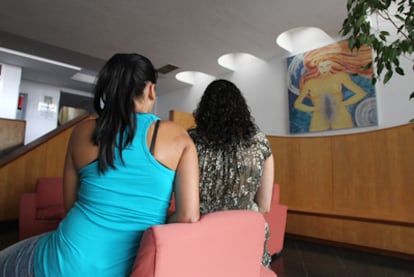Reported cases of domestic abuse on the rise in Spain
Nearly 11 percent of Spanish women say they have been the victim of abuse at some point, says survey
Cases of gender violence are rising. Nearly 11 percent of Spanish women - more than two million - say that they have been the victim of abuse at some point in their lives, according to a new survey. Of these, three percent said they suffered violence over the past year.
By comparison, in 2006 only 6.3 percent of respondents reported domestic abuse at the hands of their current or former partners. It is a significant leap in just four years, and even more so if a comparison is made with preliminary government data on domestic violence - released on Friday - with those for 1999 equivalent. Since then, the number of cases has doubled.
Experts agree that rather than an actual rise in gender violence, what we are witnessing is greater awareness among the victims themselves.
"There is still an enormous veil of silence covering this type of violence, but nowadays women are admitting to it more willingly than they used to. They are more prone to putting a name on what has happened to them," says Consuelo Abril, a lawyer and spokeswoman for the government committee that investigates abuse against women.
Miguel Lorente, the government delegate against gender violence, believes that the perception of abuse itself has changed. "Many women, looking back on what happened to them 20 years ago, now realize that it was gender violence," he holds.
And the numbers are only likely to increase, warns Ana María Pérez del Campo, president of the Federation of Separated and Divorced Women. "There are many women who still do not realize that their suffering constitutes gender violence," she says.
The government's latest survey is based on 8,000 face-to-face interviews. In 2006, the method used was over 32,000 telephone interviews. These and previous surveys also analyzed the number of women who, while not viewing themselves as victims of abuse, were considered by those conducting the survey to be the target of violence. In 2006, 9.6 percent of Spanish women were thought to be victims of this kind of "technical abuse."
"Now, through personal interviews, victims are more adequately identified - that's why figures have gone up," notes Lorente. One thing that has not changed is the average victim. Abuse is still more common among foreign-born women and those who suffer from a disability. "Around 21 percent of immigrant women have suffered gender abuse at some point, twice as much as Spanish women. Among disabled women, the figure is 30 percent," explains the government delegate.
Gender violence affects children as well. Around 840,000 have been exposed to situations of violence in the past year, and 60 percent suffered direct abuse.
"Abusers use the children to hurt the women. And now that society has got them in a corner, even more so," says Lorente.
Women with children also take longer to get themselves out of abusive situations. "One of the major reasons they quote for staying in the relationship is 'for the good of the children,' when in fact that should be their main reason for getting out of it," says Abril, adding that Spain is still missing proper policies for these minors. "We have to fight to prevent them from replicating the roles they see at home."

Tu suscripción se está usando en otro dispositivo
¿Quieres añadir otro usuario a tu suscripción?
Si continúas leyendo en este dispositivo, no se podrá leer en el otro.
FlechaTu suscripción se está usando en otro dispositivo y solo puedes acceder a EL PAÍS desde un dispositivo a la vez.
Si quieres compartir tu cuenta, cambia tu suscripción a la modalidad Premium, así podrás añadir otro usuario. Cada uno accederá con su propia cuenta de email, lo que os permitirá personalizar vuestra experiencia en EL PAÍS.
¿Tienes una suscripción de empresa? Accede aquí para contratar más cuentas.
En el caso de no saber quién está usando tu cuenta, te recomendamos cambiar tu contraseña aquí.
Si decides continuar compartiendo tu cuenta, este mensaje se mostrará en tu dispositivo y en el de la otra persona que está usando tu cuenta de forma indefinida, afectando a tu experiencia de lectura. Puedes consultar aquí los términos y condiciones de la suscripción digital.








































